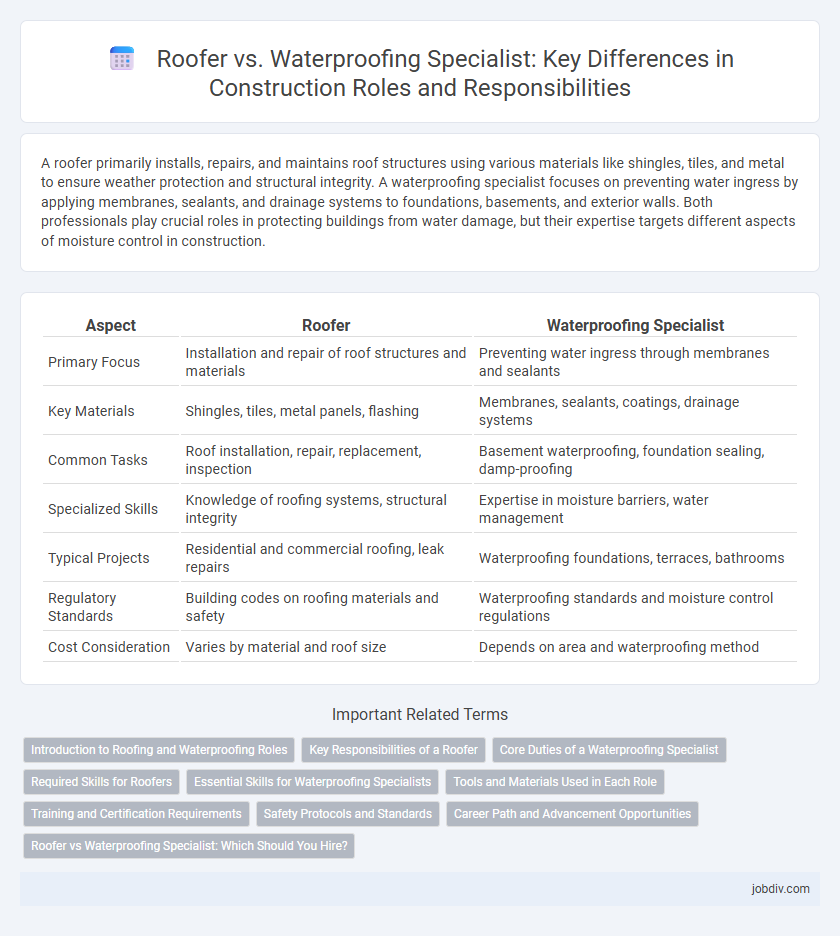A roofer primarily installs, repairs, and maintains roof structures using various materials like shingles, tiles, and metal to ensure weather protection and structural integrity. A waterproofing specialist focuses on preventing water ingress by applying membranes, sealants, and drainage systems to foundations, basements, and exterior walls. Both professionals play crucial roles in protecting buildings from water damage, but their expertise targets different aspects of moisture control in construction.
Table of Comparison
| Aspect | Roofer | Waterproofing Specialist |
|---|---|---|
| Primary Focus | Installation and repair of roof structures and materials | Preventing water ingress through membranes and sealants |
| Key Materials | Shingles, tiles, metal panels, flashing | Membranes, sealants, coatings, drainage systems |
| Common Tasks | Roof installation, repair, replacement, inspection | Basement waterproofing, foundation sealing, damp-proofing |
| Specialized Skills | Knowledge of roofing systems, structural integrity | Expertise in moisture barriers, water management |
| Typical Projects | Residential and commercial roofing, leak repairs | Waterproofing foundations, terraces, bathrooms |
| Regulatory Standards | Building codes on roofing materials and safety | Waterproofing standards and moisture control regulations |
| Cost Consideration | Varies by material and roof size | Depends on area and waterproofing method |
Introduction to Roofing and Waterproofing Roles
Roofers specialize in installing, repairing, and maintaining roof systems using materials like shingles, tiles, and metal to protect structures from weather elements. Waterproofing specialists focus on preventing water infiltration by applying membranes, sealants, and coatings to foundations, basements, and roofs. Both roles are crucial in construction to ensure durability and moisture protection but target different aspects of building envelope integrity.
Key Responsibilities of a Roofer
Roofers specialize in installing, repairing, and maintaining roof systems using materials such as asphalt shingles, metal, and tiles to ensure structural integrity and weather resistance. They inspect roofs for damage, replace worn-out shingles, and apply sealants to prevent leaks and water damage. Roofers also adhere to safety standards and building codes while working at heights and managing debris removal.
Core Duties of a Waterproofing Specialist
A waterproofing specialist focuses on preventing water damage by applying specialized coatings, membranes, and sealants to foundations, roofs, and exterior walls. Their core duties include inspecting structural areas for water infiltration, recommending appropriate waterproofing systems, and ensuring proper installation to protect buildings from moisture-related issues. Unlike roofers who primarily install and repair roofing materials, waterproofing specialists concentrate on creating moisture barriers to extend the durability of structures.
Required Skills for Roofers
Roofers require expertise in installing, repairing, and maintaining various roofing materials such as shingles, tiles, and metal sheets, along with proficiency in using specialized tools like nail guns, roofing knives, and safety harnesses. Knowledge of weatherproofing techniques, roof ventilation, and the ability to interpret blueprints and building codes are essential to ensure structural integrity and compliance. Physical stamina, attention to detail, and skill in working at heights distinguish roofers from waterproofing specialists, who focus more on sealing and moisture protection methods.
Essential Skills for Waterproofing Specialists
Waterproofing specialists possess expert knowledge in moisture barriers, sealants, and advanced membrane application techniques critical for preventing water intrusion in buildings. Their skills include precise surface preparation, material compatibility assessment, and adherence to industry standards like ASTM and IPC for effective waterproofing systems. Mastery of safety protocols and the ability to diagnose and repair waterproofing failures distinguish them from general roofers focused primarily on roofing structures.
Tools and Materials Used in Each Role
Roofers primarily use tools such as roofing nailers, shingle cutters, and roofing hammers, working with materials like asphalt shingles, metal panels, and underlayment to install and repair roofs. Waterproofing specialists employ spray foam machines, trowels, and moisture meters, applying materials such as liquid membranes, bituminous coatings, and sealants to prevent water infiltration in roofs and foundations. Each role requires specialized equipment tailored to their specific task of weatherproofing and structural protection in construction projects.
Training and Certification Requirements
Roofers typically undergo formal apprenticeship programs lasting 3-4 years, combining on-the-job training with classroom instruction, and may obtain certifications such as those from the National Roofing Contractors Association (NRCA) or manufacturer-specific endorsements. Waterproofing specialists require specialized training in materials science, moisture control techniques, and often secure certifications like the American Society of Waterproofing Contractors (ASWC) credential or International Concrete Repair Institute (ICRI) certifications. Both professions demand rigorous safety training and continuing education to stay current with evolving building codes and industry standards.
Safety Protocols and Standards
Roofers follow strict OSHA guidelines to minimize fall risks and ensure proper use of personal protective equipment (PPE) like harnesses and helmets, complying with ANSI standards for roofing safety. Waterproofing specialists adhere to ASTM waterproofing standards while implementing safety measures for handling chemical sealants and working in confined spaces, prioritizing ventilation and protective clothing. Both professionals undergo rigorous safety training tailored to their respective risks to maintain compliance and reduce workplace accidents.
Career Path and Advancement Opportunities
Roofers typically start as apprentices, gaining hands-on experience before advancing to lead roles or project supervisors, with potential to transition into construction management. Waterproofing specialists often pursue certifications in materials technology and building science, positioning themselves for roles in quality control, consulting, or waterproofing system design. Both career paths offer opportunities for entrepreneurship, with roofers tending to establish roofing companies and waterproofing experts founding specialized waterproofing consultancies.
Roofer vs Waterproofing Specialist: Which Should You Hire?
Choosing between a roofer and a waterproofing specialist depends on your specific construction needs; roofers primarily handle installation, repair, and maintenance of roofing systems, while waterproofing specialists focus on preventing water infiltration in basements, foundations, and exterior walls. Roofers use materials like shingles, metal, or tiles to ensure structural protection from weather, whereas waterproofing experts apply sealants, membranes, and drainage solutions to safeguard against moisture damage. Hiring the right professional ensures targeted expertise, cost efficiency, and long-term durability of your building's envelope.
Roofer vs Waterproofing Specialist Infographic

 jobdiv.com
jobdiv.com